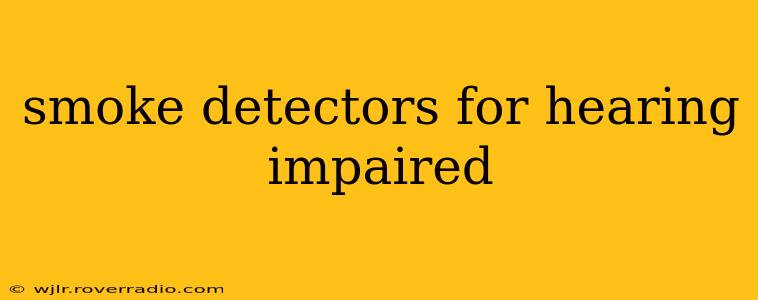For individuals with hearing impairments, the familiar beep of a smoke detector might be missed, leading to potentially life-threatening situations. This critical safety device needs to be adapted to ensure the safety and security of everyone in the home. Thankfully, several options are available to provide effective fire alerts for those with hearing loss. This guide explores the best smoke detectors for the hearing impaired, addressing common questions and concerns.
What are the Best Smoke Detectors for the Hearing Impaired?
The best smoke detector for someone with a hearing impairment will depend on their individual needs and the level of their hearing loss. However, the most effective detectors utilize multiple alert systems to ensure a reliable warning. These usually incorporate:
- Visual Alerts: Bright flashing lights are a crucial component. These are often strobe lights that are highly visible, even in smoky conditions. The intensity and frequency of the flashing lights should be significant enough to attract attention.
- Vibrating Alerts: These detectors connect to a bed shaker or personal vibrating alarm that sits under a pillow or mattress. The strong vibration is a powerful alert, even for individuals with profound hearing loss.
- Speech Synthesis: Some advanced detectors use text-to-speech technology, verbally announcing the alarm. This is particularly helpful for those with some residual hearing or who are familiar with speech synthesizers.
What is the Best Type of Smoke Detector for the Deaf or Hard of Hearing?
There isn't a single "best" type, as the ideal solution is personalized. However, a combination of visual and vibrating alerts is generally considered the most effective. Look for detectors that offer:
- Multiple Alerting Methods: This is key. A detector that only flashes lights might be missed if, for example, there is a power outage. Similarly, a vibrating alarm alone may not be sufficient if the individual is not in bed.
- Loud Audible Alarm: While not the primary focus for the hearing impaired, a loud audible alarm is still beneficial for alerting others in the household.
- Easy Installation and Maintenance: Choose detectors that are straightforward to install and maintain, ensuring they're consistently functioning correctly.
How Can I Improve My Home's Fire Safety for Someone Who is Hearing Impaired?
Beyond the type of smoke detector, several strategies can improve overall fire safety:
- Multiple Detectors: Install detectors on every level of your home, including inside and outside bedrooms.
- Regular Testing: Test your detectors regularly to ensure they're working correctly. This includes checking both the audible and visual/vibrating alerts.
- Escape Plan: Develop and practice a detailed escape plan with all household members, identifying multiple escape routes.
- Communication Systems: Consider using a visual notification system to alert family members to a fire alarm, such as flashing lights throughout the home.
- Professional Installation: For added peace of mind, consider having smoke detectors professionally installed to ensure they are correctly positioned and wired.
Do Smoke Detectors for the Hearing Impaired Need Special Wiring?
Some advanced smoke detectors may require hardwiring for optimal performance, especially those that incorporate vibrating alerts or speech synthesis. However, many are available as battery-operated units for simpler installation. Always check the manufacturer's instructions for specific wiring requirements.
Are There Smoke Alarms That Vibrate?
Yes, many smoke detectors and alert systems include a vibrating element. These often connect to a bed shaker or personal vibrating alarm. This is a particularly effective alert method for those with significant hearing loss.
Where Can I Buy Smoke Detectors for the Hearing Impaired?
You can often find these specialized smoke detectors at home improvement stores, online retailers, and medical supply companies. It's crucial to research and compare features before making a purchase to find the model best suited for your specific needs.
By taking proactive steps and utilizing the appropriate technology, we can significantly enhance the safety and security of individuals with hearing impairments in the event of a fire. Remember, consistent testing and a well-rehearsed escape plan are vital components of comprehensive fire safety for everyone.
